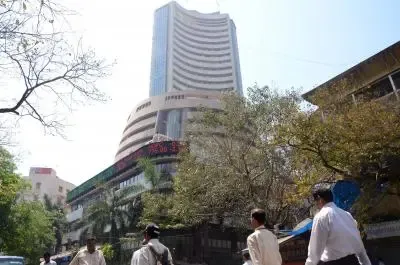Indian Stock Markets Continue Their Recovery Amid Geopolitical Uncertainties

Synopsis
Key Takeaways
- Indian stock markets gained nearly one percent.
- Global stability and FII inflows improved market sentiment.
- Geopolitical tensions with Pakistan prompted profit-booking.
- IT sector showed significant rebound.
- Consolidation expected in upcoming sessions.
New Delhi, April 26 (NationPress) The Indian stock markets continued their upward trend for another week, posting a gain of nearly one percent during a period of consolidation.
Initially experiencing a surge, the benchmarks fluctuated within a tight range throughout the week, encountering profit-taking in the final trading session. Ultimately, the Nifty and Sensex concluded at 24,039.35 and 79,212.53 respectively.
Market analysts attribute this trend to global market stability, fostered by ongoing negotiations between the United States and its trade partners regarding new trade agreements, which alleviated fears about the repercussions of tariffs on international trade.
“Additionally, the resurgence of foreign institutional investor (FII) inflows strengthened market sentiment. Nonetheless, escalating geopolitical tensions between India and Pakistan—triggered by a terrorist incident in Jammu and Kashmir—induced investor caution and resulted in some profit-booking,” stated Ajit Mishra, SVP of Research at Religare Broking Ltd.
Sector-wise, the remarkable rebound in the IT sector emerged as a significant contributor.
Furthermore, the auto, pharma, and real estate sectors also recorded gains. In contrast, the financials and fast-moving consumer goods (FMCG) sectors concluded the week in negative territory. Broader market indices managed to close positively, registering gains between 0.83 percent and 1.73 percent.
A report from Bajaj Broking Research noted that the index on the weekly chart formed a bull candle with a long upper shadow, maintaining higher highs and higher lows, indicating a positive bias with profit booking at elevated levels following a recent strong upswing.
“Looking ahead to the upcoming truncated week, a breakthrough above the last three sessions’ nearly identical high of 24,365 will pave the way for further upside towards 24,550, representing the 61.8 percent retracement of the entire decline (from 26,277 to 21,743). Conversely, if the index fails to surpass last week’s high of 24,365, it will indicate consolidation within the range of 23,500 to 24,350,” the report stated.
The Bank Nifty formed a bear candle with a lower high and lower low, signaling consolidation with a corrective bias for the third consecutive session amid profit booking after a recent strong rally of 11 percent over the prior seven sessions.
“We anticipate the index to consolidate within the range of 53,500 to 55,500 in the upcoming sessions, thereby addressing the overbought conditions developed after the recent robust rally,” remarked Bajaj Broking Research.
In the current environment, it is prudent to adopt a positive yet cautious stance, favoring hedged positions within the index.
Opportunities specific to stocks are likely to remain plentiful on both long and short sides. Therefore, emphasis should be placed on identifying stocks with favorable risk-reward profiles, according to market analysts.
On the macroeconomic front, investors will closely monitor the Index of Industrial Production (IIP) data and the HSBC Manufacturing PMI Final data. Meanwhile, geopolitical developments between India and Pakistan will remain a focal point.










